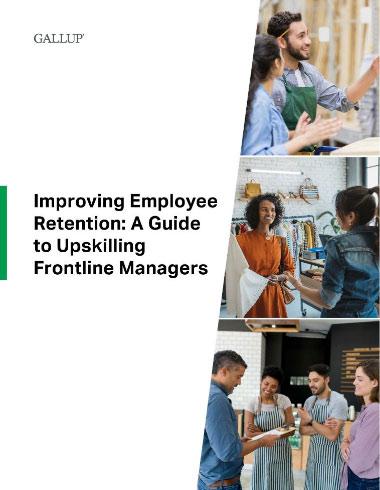Story Highlights
- CliftonStrengths positively affects employee engagement and performance
- Strengths diversity is generally beneficial but can also lead to friction
- Leaders and managers must help develop each team member's individual talents
- Learn more about how to build better teams in the workplace.
Strengths-based organizations that have had employees take the CliftonStrengths assessment may wonder if specific strengths lead to higher performance. Do teams full of individuals with Executing themes get more done? Does a team with mostly Strategic Thinking themes generate more innovations?
Additionally, leaders may wonder if they should use CliftonStrengths to engineer "perfect" teams for certain tasks. Perhaps CliftonStrengths could provide a perfect recipe for team performance.
To answer these questions, Gallup looked at six companies in six industries with team-level data on strengths, engagement and performance. Overall, we compared 11,441 teams' strengths with engagement and performance levels.
The result may be surprising: Gallup discovered that strengths awareness had twice the influence on a team's performance than the composition of a team's strengths. In other words, it's not which strengths a team has but rather how well teammates know each other's strengths.
So, why might strengths awareness be so crucial to team success?
How Strengths Awareness Turns Diversity Into Your Team's Competitive Edge
Most teams come together with diverse talents. This assortment is beneficial, potentially allowing for various perspectives, experiences and skills. But in its raw form, talent diversity can be a source of friction.
Other people's behaviors may baffle individuals with divergent strengths, and they may see opposite roads to success based on their unique ways of viewing the world.
Strengths-based training and interventions highlight these differences and turn them into assets. Gallup has found that teams that are aware of their individual strengths are highly engaged.
- They can name each other's strengths and know how those talents lead to wins.
- They have a common language and know how their team members react to changes.
- They know why certain people are in certain roles and learn to rely on each other's strengths to succeed.
In short, strengths-based training turns a group of strangers into an inclusive, aligned, collaborative team. Using diverse individual strengths together is a powerful formula for high performance.
The Strengths-Based Doppelganger: A Strengths-Similar Team
All that said, there's one important caveat to the team strengths story.
Most of the teams Gallup has studied are quite diverse in terms of strengths, but occasionally a team is composed of people with very similar strengths. Gallup research shows that teams with more similar strengths also tend to be slightly more engaged than other teams that have taken strengths but have fewer similar strengths.
How can this be? If you've ever met someone with similar CliftonStrengths, you'll likely bond more easily. They seem to "get" you right away. A group of individuals with strong Influencing themes or Relationship Building themes may find it natural (and fun) to work together.
In short, strengths-based training turns a group of strangers into an inclusive, aligned, collaborative team. Using diverse individual strengths together is a powerful formula for high performance.
It's also not surprising that teams with similar strengths are as engaged as strengths-aware teams because, in a way, they are getting the same benefits. Their team notices and appreciates what they are good at. This likely makes them feel like they belong.
This isn't a problem for the most part. But it should be something that leaders and managers are aware of. Gallup has found some cases where extreme nondiversity is bad. For example:
- Gallup worked with a retail chain to improve the performance of its stores. We discovered that if a store manager and district manager both had no Relationship Building themes, the store was in trouble. If either of them had some Relationship Building strengths, they were OK. But the absence of any social strengths in leadership was a problem.
- Gallup also worked with a financial services business that tended to hire people with strong Executing themes. When teams full of people focused on getting things done needed to build customer relationships, they struggled. Leadership initiatives slowed because they were pushing employees outside of their comfort zone.
So, while having a team with similar strengths can be a lot of fun -- and may even be productive -- it can create blind spots and weaknesses in the most extreme cases.
Guidance for Leaders and Managers: Getting the Most Out of Strengths-Based Teams
Tens of millions of people have taken the CliftonStrengths assessment, and many of those have taken it as part of workplace development. But there's a difference between knowing your strengths and being part of a strengths-based culture.
Based on Gallup's findings on strengths and team effectiveness, here are a few principles leaders should keep in mind when using CliftonStrengths in their organization:
- Use CliftonStrengths to create strengths-aware teams instead of micromanaging team talents. As far as we know, there's no perfect mix of strengths for a team. But that's good news because you don't need to know. The important thing is that everyone knows where each person excels so they can play to each other's strengths and understand how those strengths connect to success.
- If specific strengths dominate a team, notice and celebrate those with strengths that don't fit this pattern. If someone doesn't seem like a "team player," it may be because they see the world differently through their natural talents. So rather than viewing them as a source of unnecessary friction, consider how they bring something unique to the team. What can they do well that nobody else on the team can do? CliftonStrengths helps people know how each team member is individually valuable, which can increase feelings of inclusion.
- Beware of selecting talent based on people you naturally click with. Picking out people who share your talents is easy. But over time, if you keep selecting the same type of people for the team, you could create blind spots and deficiencies. For instance, on a small team, people with the same strengths could be doing the same thing when it comes to certain tasks. If everybody on the team has the Command theme, who's going to follow?
The bottom line is that everyone has strengths they use in different ways. It's not which strengths you have but rather knowing who you are and how to use your unique strengths. And while we can't change our talents, we can maximize them for specific situations or tasks.
With this knowledge, when teams with diverse strengths learn about each member's strengths, it reveals new possibilities, solutions and pathways to success.
Unleash a team's potential by helping each member know and use their strengths:
- Read this guide and start giving your managers exactly what they need to retain and engage their teams.
- Discover how leaders and managers can use CliftonStrengths in their organization.
- Create a strengths-based company culture where strengths-based teams can thrive.
CliftonStrengths® and each of the 34 CliftonStrengths theme names are trademarks of Gallup. Copyright © 2000 Gallup, Inc. All rights reserved.




